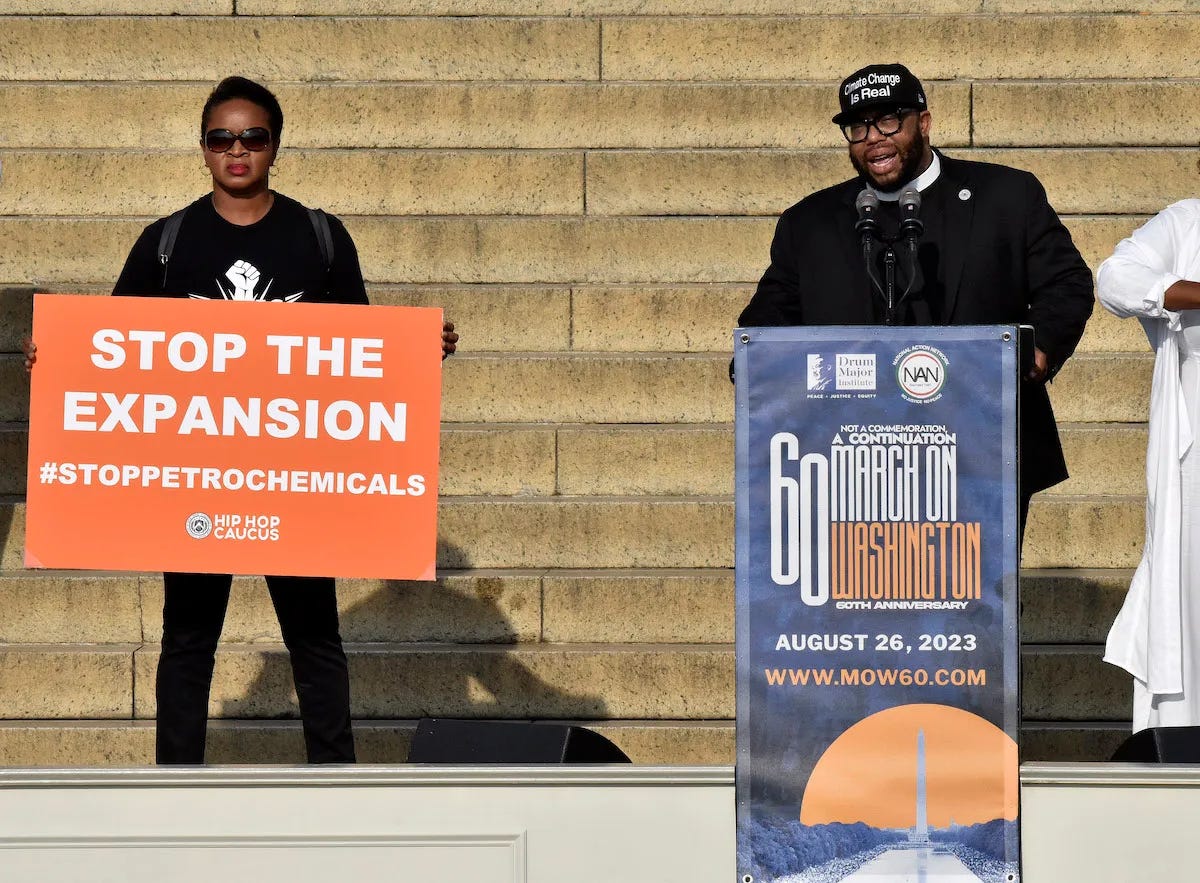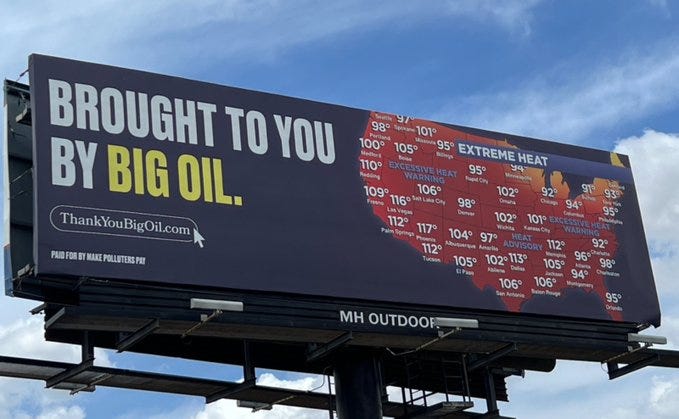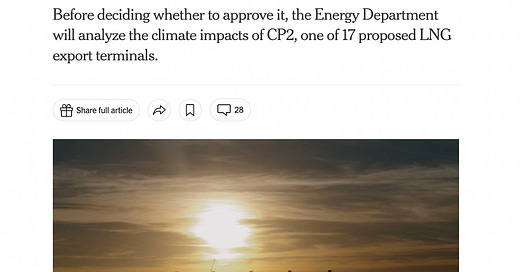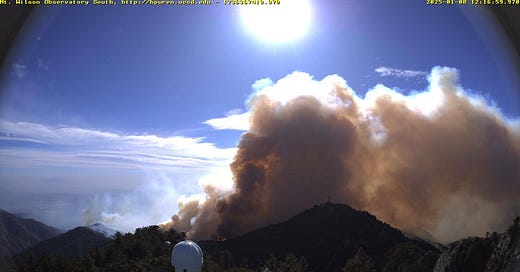

It may not surprise readers of this newsletter when I say that my great American hero is the Reverend Martin Luther King Jr. To mark the 60th anniversary of the March on Washington, I’ve been reading Jonathan Eig’s very fine new biography and re-reading for the umpteenth time the unsurpassable three-volume account of King and the civil rights movement by Taylor Branch.
And as ever I come back to the same place: King’s heroism came from his unmatched ability to combine the prophetic and the practical. We have plenty of great Americans who exemplified one or the other, but perhaps only Lincoln comes close to mixing them with the same alchemical power. King had many tools that lent him strength: he was able to listen, capable of keeping his ego in check, naturally empathetic, grounded from youth in the (not inconsiderable) politics of the church. He had the support of a strong family and a stronger wife; all of that allowed a kind of low-key and appropriate messianism that never overwhelmed him. He wasn’t a saint (the job description of prophets and saints are very different) but he was radiant.
But King also had the advantage of timing. He spoke to an America that could—in its middle—be moved by the two appeals that were his specialty: to the shared Christian faith of the great majority of Americans, and to a shared sense of America’s unique small-d democratic history. He was, obviously, no sucker: he knew as well as anyone the limits of both that faith and that history. But through those lenses America could glimpse his deeper truths.
We’re not in that America any more, which perhaps helps explain why the many speakers at this weekend’s 60th anniversary of the March reached fewer souls. There’s little that’s universal left to appeal to in a deeply divided America. Which is why, as my last book argues, it was probably unwise of progressives to surrender the flag and the cross, but that Jordan has been crossed in reverse.
Still, there is at least one universal left, and that is the shared world we inhabit. No one invoked this more movingly on the weekend than Rev. Lennox Yearwood, one of King’s great heirs. The founder of the Hip Hop Caucus (and a board member with me at Third Act), Yearwood used his two minutes to get a lot across:
We stand here because climate change is a civil rights issue. We have a right to clean air and a right to clean water. And it's critical for us to understand that this climate crisis that is happening from California to Arizona, where our mothers and fathers are literally cooking to death in their homes… And we understand right now that to be in this movement… that we must be intersectional environmentalists.
And that means that we must connect the dots and break the silos. That means that racial justice is climate justice. And climate justice is racial justice. And we understand that we must connect a dot between voter suppression and healthcare and education. We understand that we must fight for those who are fighting for clean water in Jackson, Mississippi. And women fight for those who are in Atlanta, Georgia saying, stop cop city.We applaud this administration for what they've done with the Inflation Reduction Act and the bipartisan infrastructure law. We applaud them, but that's not enough because you can't put up solar panels on Monday and build pipelines for liquified natural gas on Tuesday. You can't put renewable energy on Wednesday and discuss an all-of-the-above strategy for fossil fuels on Thursday. And so what we are calling for right now are three main things that first, that we must stop the expansion of petrochemicals across this country right now. And secondly, we must ban vinyl chloride, that explosive chloride that exploded in East Palestine. And the last thing, if the administration is watching right now, we must declare a climate emergency!
To unpack a little, as the scholars say, it seems to me that Yearwood is making at least two key points. One is that there are specific parts of the climate crisis that are far worse for poor people of color, here and around the world, and that empowering them is a key task, both for practical reasons of power and moral reasons of justice. It’s a point made with great grace by Rhiana Gunn-Wright, the transcendently nerdy author of the Green New Deal, in an essay that came out this morning in Hammer & Hope, the new online magazine of Black politics and culture. As Gunn-Wright put it
More than 170,000 green jobs have been created in the wake of the IRA, a majority of them in red states, some of which, like Texas and Georgia, have the largest and fastest-growing Black populations in the country.
I should be happy about that. I want to be happy about that. By “derisking” clean technology through public subsidies and other forms of industrial policy, the IRA is succeeding, at least in its mission to spur private investment in clean energy and low-carbon goods. And after 40 years of exclusively neoliberal economic policy, that is something to celebrate. But the transition to clean energy, like every other economic transition, is inherently distributive and redistributive — especially in a capitalist society — and this time, we need Black people to significantly benefit. Yet, with the exception of a few targeted policies, the IRA and the debates that have emerged since its passage suggest that the U.S. is again (at this big age!) relying on white supremacy to decide how to allocate the power and resources that come from going green.
Her recommendations are tremendously useful (the whole essay is essential reading), and they include some clear specifics:
For the green transition to be equitable, racial justice must thread through all the decisions about how it is structured and how public resources are distributed. One of the best ways to do this is to expand Justice40, a Biden administration initiative that aims to direct 40 percent of the benefits of federal clean energy and other climate investments to disadvantaged communities. The White House should update that order to include all of the programs in the IRA, and agencies should ensure that 40 percent of the funding (not nebulous “benefits”) are going to the communities identified by the White House’s new screening tool to identify communities that have faced historical environmental and economic injustices. In programs where it is not possible to ensure that 40 percent of funding reaches frontline communities, as with individual tax credits, agencies need to create partnerships with community organizations and local governments to try to increase tax-credit participation among eligible Black households.
This seems inarguable to me. But to the degree that it requires a big movement to get it done, it requires an elevated sense of justice that I’m not sure we have at the moment. In King’s world, a concern for justice grew out of both religion and patriotism, and with those gutted it’s harder to reach the broad middle.
But it also—and this is the second part of Yearwood’s message—seems inarguable that we have a rare moment to establish that new universal. This summer almost everyone has a) sucked smoke b) dodged floods c) endured preposterous heat. Many have hit the trifecta. Yes, some people have had it worse than others, and since this is America those people are likely to be poor and Black. But we’re at the point where everyone can start to feel the threat. (Even asocial billionaires, though they tend to respond by buying up land they imagine will offer an escape). That collective fear/sadness/anger/maybe a little hope constitutes a shared self-interest—one that we can build on to make the kind of broad movement that might make justice real again.
I think it’s likely we’ll get to see this strategy play out in the months ahead at a place that Gunn-Wright mentions in her essay: Calcasieu Pass, Louisiana, site of yet another proposed giant LNG terminal. And I imagine that Yearwood, concentrating on his work with Beyond Petrochemicals, will be heavily involved. But that is a story to come.
For now, enough to end with this thought. Were MLK still alive (and it’s not impossible—his friend and colleague Harry Belafonte was born two years earlier and just died in May) it seems certain to me that the climate crisis would be at the top of his agenda, because he was drawn to any project that emphasized commonality. The Poor People’s Campaign, which he was building when he was murdered, was a multiracial effort to unite impoverished people for radical change; the climate movement is perhaps the first truly global campaign, designed to bring everyone who lives beneath our shared sky on board. As Dr. King put it, “We are caught in an inescapable network of mutuality, tied in a single garment of destiny.” Climate change is the ultimate proof of that truth
In other climate and energy news:
+Pope Francis plans a follow-up to his his massively important pastoral letter on climate change, Laudato Si. This statement, due in early October on the feast day of his namesake saint, will document what he calls a “world war on nature.”
+First Nations leaders in Canada have published a letter urging Ottawa to stop supporting Line 5, the tarsands pipeline across the Great Lakes. Whitney Gravelle, chair of the Bay Mills Indian Community:
“Canada’s support of Line 5 is a disaster in the making for the entire Great Lakes region. An oil spill would poison our fish, harm our sacred sites, contaminate our drinking water – and ultimately destroy our Indigenous way of life. In the last 50 years, Line 5 has been the source of more than 30 oil spills, releasing over a million gallons of toxins into the environment. Every minute Line 5 continues to operate extends the likelihood of further catastrophic oil spills along its route. The rights of Indigenous people should be respected by all sovereigns, both domestically and abroad. Line 5 violates these rights, and Canada must revoke its consent for Line 5.”
+It’s possible the Tidelines Institute is the most beautiful school in the world, and from it’s southeast Alaska base, co-director Zach Brown offers a straightforward and smart video on how students can take climate action. Above all, the most important thing an individual can do is be a little less of an individual!
+Cross country skiing’s premier American event, the Birkebeiner, draws ten thousand athletes to northern Wisconsin each winter. This winter, at the 50th running, they’ll be led by an electric snowmobile
“Like many snow sports industries, the Birkie is not immune to the effects of warmer winters. In 2017 they had to cancel the event due to lack of snow – the second time in less than 20 years. Acknowledging its own carbon footprint, the American Birkebeiner Ski Foundation is moving towards being a good environmental steward and in support of their efforts, our Birchleggings Club organized a fundraiser selling shopping bags made from recycled race bibs,” said Thompson. “In addition to removing race bibs from the waste stream, we raised enough money to purchase and donate the Taiga Nomad snowmobile in commemoration of ABSF’s 50th anniversary”.
+Dave Margulius has compiled an ingenious playlist of ads from around the world for heatpumps. Check out #6, for the Mr. Slim Happy Inverter!
+Charlie Komanoff is a stalwart veteran of the fight for carbon pricing and alternative transportation in the New York area, but I never knew he’d inherited this streak from his mother, Hannah. In a quite lovely essay on the need for offshore wind in Long Island Sound, he invokes her five-decade history of standing up. “When clean energy arrives in abundance, we can’t block the way,” he writes.
+Saudi Aramco is the single biggest corporate emitter of carbon on the planet, and team of UN experts wrote the company last week to warn them of the human rights violations associated with those ongoing emissions. As the environmental law firm Client Earth explained,
the UN experts expressed concern about how the oil giant’s actions may contribute to undermining the Paris Agreement in the face of the existential threat to human rights posed by climate change. They also said the involvement of financial institutions in the financing of Saudi Aramco’s activities could be in violation of international human rights law and standards.
It is the first time the UN experts have taken action about an oil major’s human rights responsibilities for climate change under the UN Guiding Principles on Business and Human Rights (UNGPs), or against financial backers of oil and gas expansion.
+From longtime climate campaigner Nicolo Wojewoda, a fascinating essay on how to ‘unstick’ the European climate movement. After the shocks of the pandemic and the Ukraine invasion, he writes, basic public support for a swift transition to renewables remains strong, but
that base of public support hasn’t expanded, and it hasn’t turned from passive support into active action to drive change at the scale that’s required. Looking inside the black box that is the climate movement, understanding its actors and relationships, might help explain why…
As of August 2023, the frontlines of the climate movement are in Vanuatu where plans are underway to relocate dozens of villages to safer land. And to a much lesser extent, they are also in the wildfires ravaging Sicily, the areas of France where unprecedented freezing temperatures are destroying large swathes of vineyards, and in homes of pensioners in Manchester who can’t afford to keep the heat on during winter.
+US climate envoy John Kerry gave a big speech in Edinburgh Scotland last week, and because the main street of that lovely city is decorated with statues of the heroes of the Enlightenment, he invoked their spirit:
Well, ladies and gentlemen, in 2023, we again stand on the precipice where Hutton and Voltaire once stood.
Despite a vast array of empirical facts beyond any shadow of reasonable doubt, despite thousands of scientists’ lifetime work accumulating hard data, and without a single piece of peer reviewed, documentation to the contrary, we are again witnessing another moment in which the persuasive force of evidence and with it, earth’s future hangs in the balance.
All because some extremist political voices, holdout nations, and vastly vested interests have declared war on facts and science. All because they distort for political or personal gain what science and common sense dictate we humans must do to put our house in order. These interests would choose a destructive status quo over the opportunity to build a clean energy economy which can rescue our future, put millions of people to work and leave us all safer, stronger, and more secure.
Without facts or economics on their side, they flatly deny what is happening to our planet and what we must do to save it.
They incite a movement against what they falsely label “climate change fanaticism,” as they conveniently forget that the dictionary definition of a cult is the dismissal of facts in devotion to a lie.
+Degrowth advocate Christopher Ketcham on indigenous opposition to mining for minerals needed for green energy projects, focusing on lithium mining at at Nevada site called Thacker Pass
While the progress-minded executives of Lithium Americas told The New York Times that they were “answering President Biden’s call [to] tackle the climate crisis,” the Grandmas at Thacker Pass held a different view. Mining for the expansion of the electric vehicle fleet and the greening of the energy grid was for them no different than blowing up the valley for a coal mine. They saw the pillage of their sacred site as another iteration of rapacious techno-industrialism, the specialty of the white man’s culture. “This is just the same old program,” one Paiute resister, who requested anonymity, told me. “Neocolonialism. Extract and exploit. But now it’s ‘for’ the climate.”
+I am a sucker for the genre of stories about how energy researchers are learning to use ever-simpler tools to get the job done. To wit, the advent of the sand battery
At Polar Night Energy’s facilities in the city of Tampere Finland, and the nearby town of Kankaanpää, hulking steel vats hold heaps of sand, heated to around 1,000 degrees Fahrenheit. That stored energy helps to smooth out power grid spikes and back up district heating networks, keeping homes, offices, saunas and swimming pools warm. The heat keeps flowing, even in remote areas, even as Russian fossil fuel supplies dwindle.
“Sand has almost no limits,” said Ville Kivioja, Polar Night Energy’s lead scientist, speaking over the whirring sound of the substance circulating. “And it’s everywhere.”
+The intrepid campaigners trying to stop the Mountain Valley Pipeline in Appalachia, rebuffed by the Supreme Court last month in an effort to force serious environmental review of the project, are now taking on the banks that are financing this boondoggle:
People power has successfully stopped construction of the Mountain Valley Pipeline so far, and we won’t back down now,” said Denali Nalamalapu, Communications Director at POWHR. “If Congress wants to take away our legal avenues to fight this project, then we will take it to the next level by targeting the financial backers of this project. We are issuing a warning to the big US banks providing financing to the companies behind the Mountain Valley Pipeline: Our global movement is stronger than ever and the big banks should expect to be hearing more from us in the coming months. We will never stop fighting this unfinished, unnecessary, and unwanted project.”
Meanwhile, writing in the LA Times, Cornell professor Caroline Levine reminds us that our own money, in the form of pensions, may be buttressing climate destruction like the Maui wildfires.
Just 23 investors are responsible for 50% of worldwide investments in fossil fuels. The biggest culprits are asset management giants Vanguard and BlackRock, with Fidelity Investments, JPMorgan Chase, T. Rowe Price, Bank of America and Berkshire Hathaway also making the list. My own retirement fund, TIAA, a nonprofit founded for teachers, manages at least $78 billion in fossil fuel-related holdings, according to one analysis.
+Highway billboards are a blight (if you don’t believe me, visit Vermont where they’ve been outlawed for decades; you’ll be amazed how restful it is without them). But if you’re going to have them, they might as well remind motorists of the role that Big Oil is playing in this summer’s insane heat. So kudos to activists in Phoenix, Fresno, and Austin for getting the word out
+Writing in the Duluth Reader, Tone Lanzillo says we need a new cartography for the climate era:
Earlier today, the Minnesota PolIution Control Agency reported that Duluth is still in an Orange air quality alert due to heavy smoke from the Canadian wildfires. Also, the StarTribune reported that three quarters of Minnesota is still experiencing drought conditions and Duluth is currently in severe drought. And there was David Wallace-Wells' opinion piece in the New York Times, where he wrote that the fires in Hawaii have changed and radically transformed the state's landscape
Whether it's in Hawaii, Canada or here in northern Minnesota, thousands if not millions of us are now experiencing loss and grief, and maybe more significantly, are beginning to feel more confused and disoriented with an ever changing landscape. From paper maps over fifty years ago to google maps on the cellphone today, we have used maps to help us figure out where we are and where we're going. But maps only work and are useful if they present an accurate and current representation of the terrain or territory that you plan to travel through.
So, in this climate-change world, if we choose to use maps that don't reflect what's actually happening, don't present an honest picture of what we've already lost and are projected to lose in the coming years, then it's a foregone conclusion that we can't make informed decisions or choose the most appropriate responses. We'll just become lost and won't adapt.
+ Ever wonder what trees talk about? Check out Sam Kauffman’s new video
+Some very good news on a long-running story: an abandoned oil tanker, caught in the crossfire of Yemen’s endless civil war, has been slowly decaying, with the constant threat that a million barrels of oil might leak at any moment. Happily, an international rescue effort has now succeeded in pumping it safely into other boats.
“Today is a proud moment for the many people across the UN System as well as our donors and partners who have worked tirelessly over the past months and years to avert a disaster in a country already vulnerable following protracted conflict,” said Achim Steiner, UNDP Administrator.
“There is still work to be done, but today we can say with confidence that the immediate threat of a spill has been averted,” he added.
+Read about the Village Infrastructure Angels, or VIA, who have been bringing renewables to rural Africa. Among other things, they’ve produced the first “fully automatic solar washing machine.” They were one of the recipients of the Keeling Curve prize in 2021; read about this year’s winners here
+Climate change is making it ever-harder to keep the Panama Canal, and with it world trade, running smoothly. Not to mention the Mississippi River. Not to mention the Rhine. Somini Sengupta, as so often, has the story:
Ships have had to watch their weight this year, which means reducing cargo volumes. Fewer ships are going through each day; the Panama Canal Authority, which runs the waterway, has restricted the number to 32 per day now, compared with 36 to 38 at other points.
There is little rain in the forecast, which means the canal’s problems are not expected to ease up anytime soon.
Global trade is also part of the climate problem. Ships use heavy fuel oil, which accounts for roughly 3 percent of global greenhouse gas emissions. The industry recently agreed to neutralize its emissions by or around 2050, though climate advocates called the plan “vague.”
+The Financial times reports that subsidies for the fossil fuel industry just keep rising, hitting a record $7 trillion last year.
The IMF study said subsidies for coal, oil and natural gas in 2022 were equivalent to 7.1 per cent of global gross domestic product. This represented more than governments spent on education, and two-thirds of what was spent on healthcare. The elevated figure produced by the IMF includes so-called implicit subsidies, which are the result of governments undercharging for the environmental costs incurred by burning fossil fuels. These costs include air pollution and global warming, the IMF said.
+Antarctic sea ice is at record lows, and it looks like Emperor Penguins are a serious casualty
Four out of five emperor penguin colonies in Antarctica’s Bellingshausen Sea region very likely lost their chicks late last year because of disappearing sea ice underneath their breeding grounds, according to a new study.
Parts of this coastal region had lost all of their sea ice by November, which was probably before penguin chicks had grown waterproof adult feathers and learned to swim. It’s the first time scientists have seen a widespread failure across multiple penguin colonies in a region, researchers said.
“At the moment, we’re not sure if this is just a blip,” said Norman Ratcliffe, a seabird ecologist with the British Antarctic Survey and one of the authors of the new study. “But if this becomes a consistent phenomena in the longer term, clearly it’s going to have repercussions for the species.”
+A big new cargo ship set sail last week—with sails, which should decrease its energy use by about a third.
















Thank you for these words on MLK. I so appreciate your insights.
This is such a consequential essay, Bill. Thank you for the information, perspectives, and most of all for the links to resources. I believe this to be one of the most important letters to the public. Thank you!